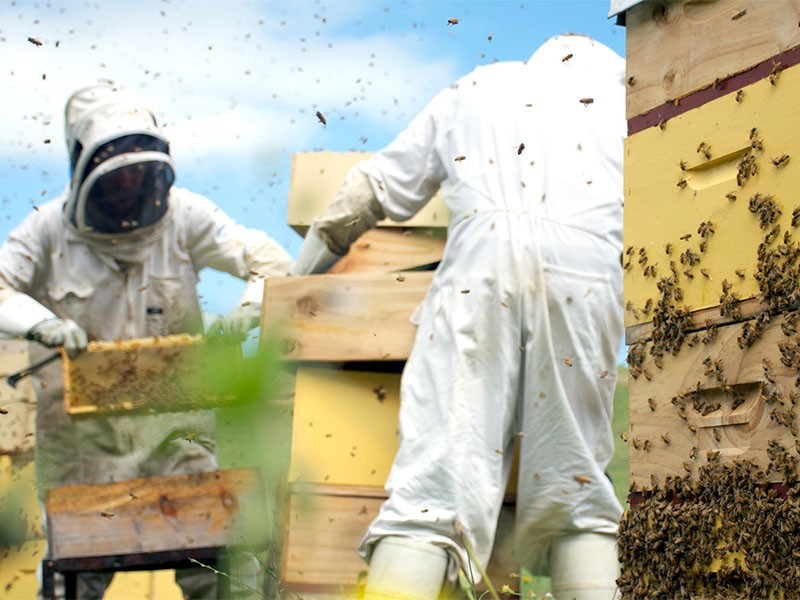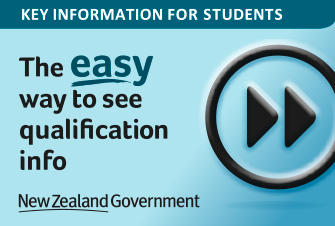- Home
- Horticulture / Agriculture
- NZ Certificate in Apiculture (Level 3)
NZ Certificate in Apiculture (Level 3)
Please note this programme is on hold for 2024. Register your interest for 2025 by clicking on the Enquire now button.
Have you heard the latest buzz?
If you have ever wanted to work in the apiculture industry on a small scale or are assisting in a commercial beekeeping operation then this programme is for you.
On completion of this qualification you will own your own beehive and be able to work under limited supervision to maintain, manipulate and operate beehives to produce quality products and pollination services.

Outline
If you have ever wanted to have your own beehive or are working or intending to work in the apiculture industry on a small scale (as a lifestyle option or part-time business opportunity) or are assisting in a commercial beekeeping operation then this programme is for you.
Once you successfully complete the programme you will own your own beehive and be able to work under limited supervision in a commercial beekeeping operation or independently in a small scale operation.
You will also be able to:
- Maintain, manipulate and operate beehives to produce quality products and pollination services.
- Assist to transport beehives and bee products and establish hives in new sites.
- Carry out a beehive disease management plan.
You will learn how to:
- Identify the regulations and safety requirements for beekeeping in New Zealand.
- Identify and explain the biological and behavioural aspects of honeybees in relation to plant biology and pollination.
- Identify and use personal protection equipment, beekeeping tools, and ancillaries.
- Construct and repair a beehive.
- Install, inspect and maintain hives throughout the seasons.
- Explain and demonstrate feeding management and maintenance requirements for bee colonies.
- Remove supers and extract honey.
- Assist transporting and establishing hives and bee products.
- Identify and explain the signs and symptoms of an ill colony.
- Explain the symptoms and lifecycles of common diseases and disorders.
- Provide recommendations to manage disease, pest and disorders identified during inspection testing.
- Describe methods and procedures used for integrated pest management (IPM) control.
- Identify and explain disease and pest chemical controls and their hazards.
- Explain and demonstrate the procedures utilised in the disinfection of hives, personal equipment and elimination of hives.
Dates
PLEASE NOTE: This programme is on hold for 2024. Register your interest for 2025 by contacting Diana Morris, Programme Administrator, on 06 830 1057 or dmorris@eit.ac.nz
Your future career and study opportunities
This qualification is an entry point for apiculture training and may lead onto the NZ Certificate in Apiculture (Level 4) or the NZ Certificate in Apiculture (Queen Bee Rearing) (Level 4).
A graduate of this certificate can work as an assistant beekeeper for a commercial operator or as an independent beekeeper with a small number of beehives.
Entry
Entry requirements
Applicants must:
- Be 16 years of age at the time the programme commences.
- Be physically able to complete the programme specific outcomes.
- Have attained NCEA Level 1; or
- A qualification at Level 1 or above, with evidence of literacy and numeracy abilities equivalent to NCEA (Level 1); or
- Evidence of relevant knowledge and experience, including literacy and numeracy abilities equivalent to NCEA (Level 1). In this case the applicant may be required to participate in an enrolment interview with the purpose of verifying the evidence.
Special entry
In exceptional circumstances an applicant who does not meet the academic entry requirements may be granted entry to the NZ Certificate in Apiculture (Level 3), where they supply evidence to satisfy EIT | Te Pūkenga of their ability to succeed on the programme.
English language entry requirement
Applicants for whom English is not their first language must have an acceptable level of English language fluency prior to enrolment in the programme. Ways in which English language fluency may be demonstrated include successful study of a programme in which English was the language of instruction (conditions apply); completion of a New Zealand Certificate in English Language (Level 3 with any endorsement); approved scores on IELTS tests (Academic score of 5 with no band score lower than 5); or completion of accepted international equivalents.
Entry with credit
You may already have some knowledge or skills that can be recognized as part of your intended study. This may take a number of different forms including study at a private training establishment, workplace training, other tertiary study, life experiences or voluntary work.
If you think you may qualify, you may want to apply for Cross Credit (CC) or Recognition of Prior Learning (RPL).
- CC is based on the equivalency of courses or qualifications. You would apply for CC if you have passed a very similar course at the same level.
- RPL is based on the assessment of your current knowledge and skills. You would apply for RPL if you had gained the relevant knowledge and skills through life experiences and informal learning situations.
You will be asked to provide details of anything that you would like considered as credit toward your intended programme of study, as part of your application.
Applications for CC and RPL for a course should be made prior to enrolment in that course and no later than two weeks after the start of the course.
Transfers/cross credit
There is no previous EIT | Te Pūkenga programme which leads directly to the NZ Certificate in Apiculture (Level 3) qualification, however the EIT | Te Pūkenga Transfer/CC and RPL Policies and Procedures may apply to applicants who wish to apply for recognition of prior learning or transfer/cross credit.
For further information and enquiries about CC and RPL please contact Diana Morris, Hawke’s Bay Programme Administrator, on 06 830 1057 or Erena Clarke, Tairāwhiti Programme Administrator on 06 869 0820.
Academic learning services
Academic Learning Services is here to assist you on your journey towards the successful completion of your studies at EIT | Te Pūkenga. Our aim is for you to become confident, competent and independent learners.
We have dedicated advisors who can assist with your learning.
Find out more:

Scholarships
 EIT | Te Pūkenga offers a variety of scholarships across various subjects and programme levels. Some scholarships are based on your age, some are specific to the subject you want to study. Not all scholarships are based on your academic ability and anyone wanting to study should investigate what scholarships are available to them.
EIT | Te Pūkenga offers a variety of scholarships across various subjects and programme levels. Some scholarships are based on your age, some are specific to the subject you want to study. Not all scholarships are based on your academic ability and anyone wanting to study should investigate what scholarships are available to them.
You can find a list of EIT | Te Pūkenga scholarships here however there are many more scholarships offered nationally. Information about these is on an database called “givME”. givME is accessible at EIT | Te Pūkenga or at some public libraries. If you would like to come to EIT | Te Pūkenga to look through the giveME database don’t hesitate to contact scholarships@eit.ac.nz or call in for a chat.

